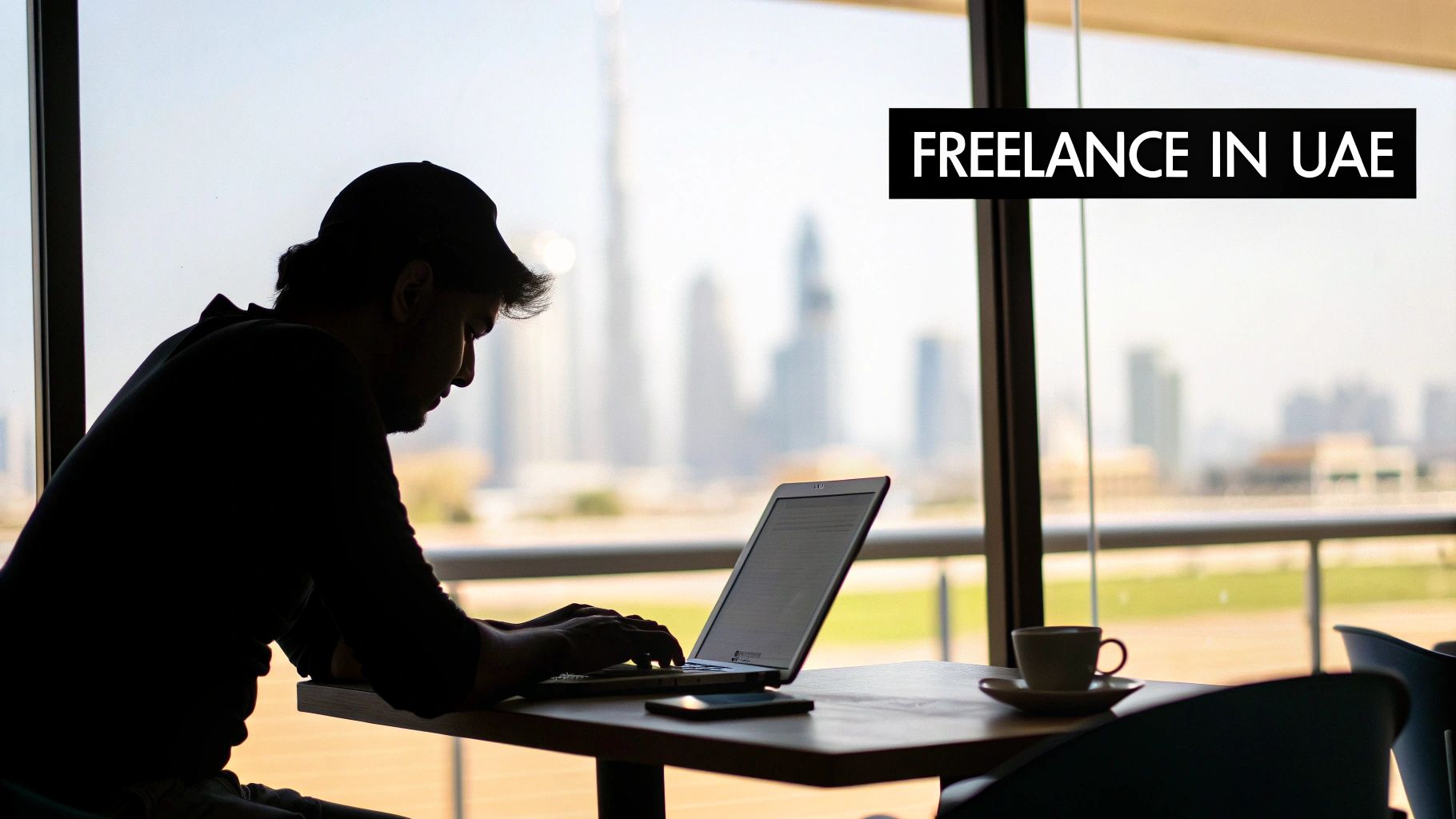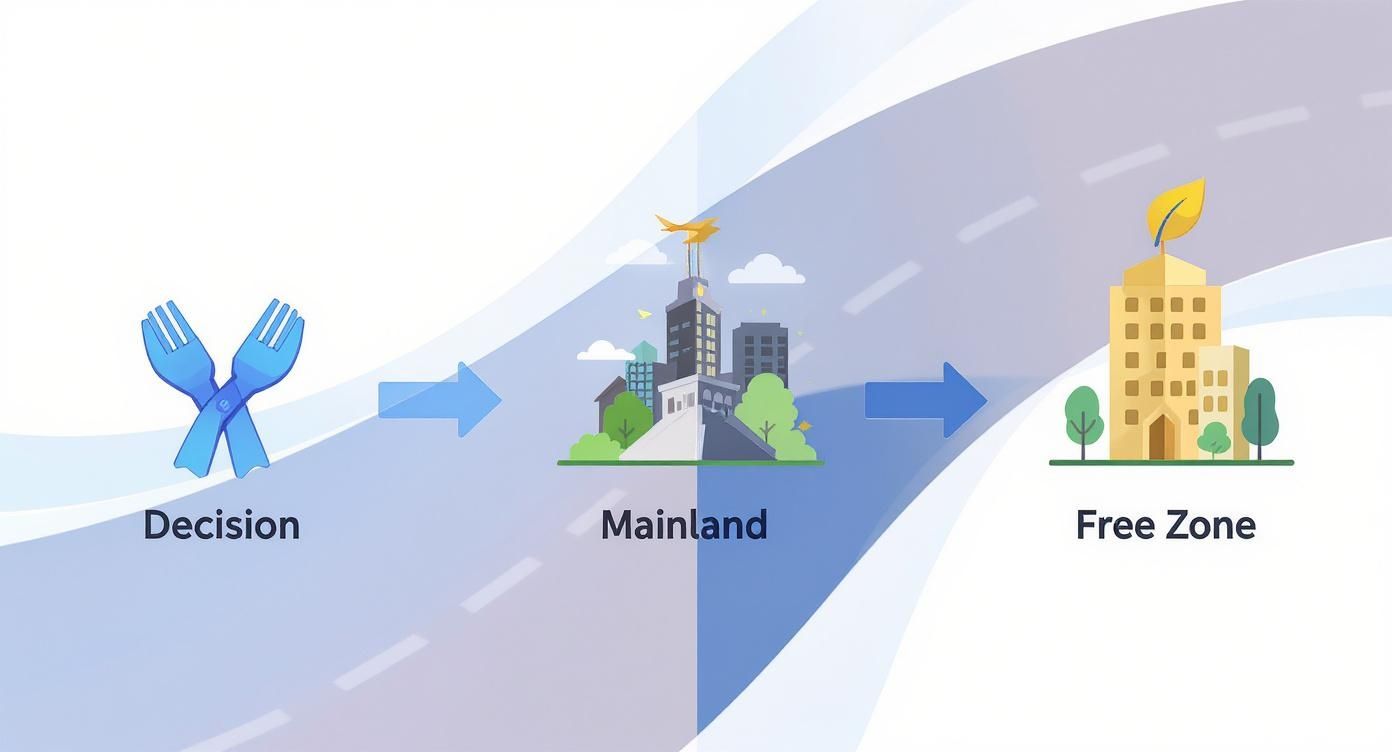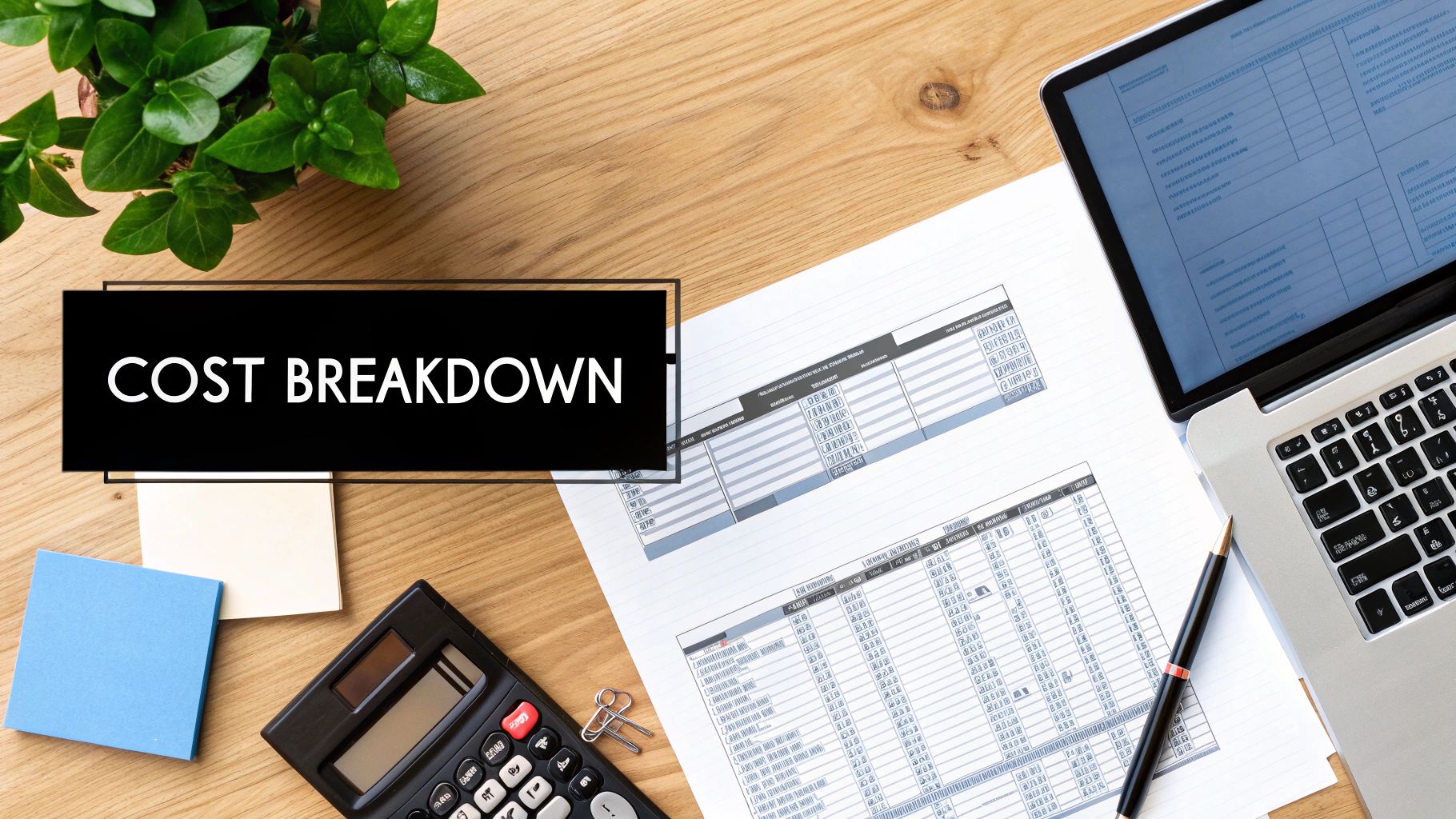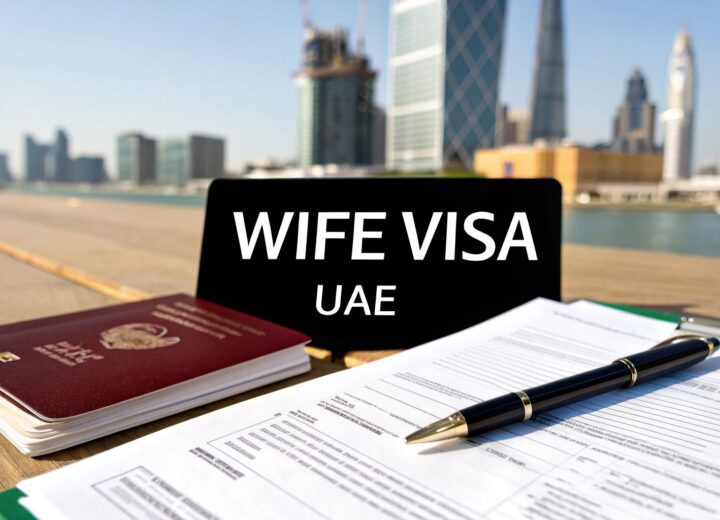So, what exactly is a UAE freelance visa? Think of it as your official ticket to work for yourself in buzzing hubs like Dubai or Abu Dhabi. It's a two-in-one package: you get a freelance permit, which lets you operate legally as a one-person business, and a residency visa, so you can live in the country without being tied to a single employer. This combination gives you incredible flexibility in a seriously dynamic and tax-friendly market.
Understanding the Freelance Boom in the UAE

It’s no secret that the United Arab Emirates has become a magnet for independent professionals, consultants, and creatives from all over the world. This isn't just a happy accident; it's the direct result of the government's strategic push to attract top global talent and shift the economy away from its traditional reliance on oil. The freelance visa is a cornerstone of this vision, offering a clear, legitimate path for skilled individuals to build a career on their own terms.
This marks a huge change in how employment works in the region. For years, your residency was almost always linked to a full-time job with one company. The freelance visa completely breaks that old model. It empowers you with the freedom to manage your own career, juggle multiple clients, and dive headfirst into one of the most exciting business environments on the planet.
Why Freelancing is Gaining Momentum
A few key factors are driving this trend, making the UAE a top choice for self-employed experts. It’s not just about getting the paperwork sorted; getting a freelance visa is a smart career move, and here’s why.
The main drivers behind the freelance movement are pretty clear:
- Economic Diversification: The UAE is serious about moving beyond oil. This has opened up massive opportunities in fields like tech, media, education, and finance—all perfect for freelance specialists.
- Pro-Business Policies: With perks like the long-term Golden Visas, minimal taxes, and easy business setup, the UAE is rolling out the red carpet for entrepreneurs and solo professionals.
- Global Talent Attraction: The government knows that a flexible, skilled workforce is what sparks innovation. Freelance permits are a direct invitation for specialists worldwide to come and contribute to the country's growth.
- Lifestyle and Infrastructure: Let's be honest, the lifestyle is a huge draw. You've got world-class infrastructure, a super safe and multicultural environment, and an amazing quality of life. It’s a great place to actually live, not just work.
The Financial Appeal of Freelancing
The money side of things is a major pull factor. The UAE's freelance economy isn't just growing; it's booming. All the signs point to serious earning potential, with the market expanding by about 10% every year as more professionals go independent and companies look for flexible talent. For those with sought-after skills, the rewards can be significant—a recent report showed that top freelancers can pull in up to AED 3,600 a day.
A freelance visa is your key to unlocking this potential. It legalises your status, allowing you to open a corporate bank account, issue invoices, and operate with the full protection of the law. This legitimacy transforms a side hustle into a sustainable business.
As the UAE continues to embrace this new way of working, knowing how to present your independent career professionally is crucial. Learning about effectively showcasing self-employment on a resume can help you stand out and land those high-value clients. Making the switch from a traditional job requires a new mindset, and getting the right visa is the very first step.
Choosing Your Path: Mainland vs. Free Zone
So, you're ready to start your freelance career in the UAE. Fantastic. Now comes one of the first big decisions you'll need to make, and it's a crucial one: where will your business be based?
You have two main paths: setting up on the mainland or in a free zone. This isn't just about ticking a box on a form; it's a strategic choice that will shape who you can work with, how you operate, and your potential for growth down the line.
Going Mainland: The Freedom to Work Anywhere
A mainland permit, which comes from the Department of Economic Development (DED) in your chosen emirate, gives you the ultimate freedom. You can work with any client, anywhere in the UAE, without restrictions.
This means you can directly take on projects with government departments, big mainland corporations, and even companies based in other free zones. If your client list is likely to be varied and spread across the country, this is a massive plus.
Of course, this flexibility comes with its own set of rules and processes. To get a better feel for how it all works, our guide on mainland company formation in Dubai breaks down the operational side of things. A mainland setup is often the right fit for freelancers who eventually want a physical office or plan to engage heavily with the local market.
The Allure of UAE Free Zones
On the flip side, you have the free zones. These are special economic hubs—over 40 of them across the UAE—designed to make it easy for foreign talent and investment to come in. Many are even built around specific industries, creating buzzing communities for creatives, tech experts, and consultants.
For a lot of independent professionals, the benefits of a free zone permit are hard to ignore:
- 100% Foreign Ownership: This is a big one. You own your business entirely, with no need for a local partner or sponsor.
- Tax Exemptions: Most free zones offer 0% corporate and personal tax, which can make a huge difference to your bottom line.
- Industry-Specific Hubs: Imagine being based in a place like Dubai Media City or Ras Al Khaimah Economic Zone (RAKEZ). You’re surrounded by potential clients, collaborators, and peers.
- Simplified Setup: Free zones are known for being freelancer-friendly. Their administrative processes are generally quick and supportive, making the whole registration and visa part of the journey much smoother.
This model is perfect for freelancers whose clients are mostly international or based within the same free zone ecosystem. And while there are some rules about working directly with mainland companies, there are usually workarounds, like using a third-party agent.
To help you see the differences side-by-side, here’s a quick comparison.
Mainland vs. Free Zone Permit at a Glance
Choosing the right jurisdiction is about aligning your business setup with your professional goals. This table offers a side-by-side comparison to help you decide which path—Mainland or Free Zone—is the better fit for your freelance career in the UAE.
| Feature | Mainland Permit | Free Zone Permit |
|---|---|---|
| Client Access | Unrestricted access to all UAE clients (mainland & free zone) | Primarily other free zone companies and international clients |
| Ownership Structure | Often requires a local service agent (LSA) for 100% ownership | 100% foreign ownership, no local partner needed |
| Tax Benefits | Subject to UAE corporate tax regulations | 0% corporate and personal income tax |
| Office Space | Physical office space is usually a requirement | Flexible options, including co-working spaces or no physical office |
| Industry Focus | General, suitable for a wide range of activities | Often specialised hubs for tech, media, design, etc. |
| Setup Cost & Complexity | Can be more complex and costly | Generally more streamlined and cost-effective |
Ultimately, both options provide a solid foundation for a freelance business. Your decision should hinge on your target market and long-term ambitions.
Making the Right Choice for Your Career
So, how do you pick? It comes down to your business plan.
Ask yourself a few simple questions. Who are my ideal clients? Do I need a physical office? Do I see myself hiring people in the future? Your answers will start to paint a clear picture of which direction to go.
Your choice between mainland and a free zone isn't permanent, but getting it right from the start saves time and money. Think about your five-year plan—a mainland setup might offer more scalability for local growth, while a free zone provides a cost-effective and supportive launchpad for international operations.
The very fact that we're having this conversation shows how much the UAE is embracing independent professionals. Freelancer registrations in the wider MENA region have shot up, with a reported 78% increase in just the last year.
This incredible growth, as highlighted in the detailed report on Khaleej Times, is a direct result of the government’s forward-thinking policies. They've simplified the legal side of things, making it easier than ever for experts like you to work on their own terms and contribute to the economy without needing a local sponsor.
Navigating the Freelance Visa Application
So, you’ve weighed the pros and cons and decided between a mainland or free zone setup. What’s next? The application itself. This part can feel a bit daunting, but it’s much more manageable when you break it down into a series of smaller steps.
Getting your UAE freelance visa isn't a single event but a sequence of key stages. From getting your personal and professional documents in order to completing the medical checks, each part of the process is there to verify who you are and what you do, setting you up for a smooth start in the UAE.
This visual guide breaks down the typical journey for a freelancer, from that initial mainland vs. free zone choice all the way to getting the visa stamped in your passport.

As the infographic shows, it all starts with that strategic choice, which then sets the specific administrative path you'll need to follow for both your permit and your visa.
Assembling Your Essential Documents
Before you even think about filling out an application form, your first job is to gather all your paperwork. Honestly, getting this right from the beginning is the single best thing you can do to avoid headaches and delays later.
Here’s what your core document checklist will usually look like:
- Passport: A clear, colour copy of your passport. Make sure it has at least six months of validity left.
- Passport-Sized Photograph: A recent photo with a crisp white background, following the standard UAE visa photo rules.
- Curriculum Vitae (CV): Your updated CV, highlighting the experience and skills that line up with your freelance work.
- Attested Educational Certificates: Copies of your university degree or other relevant qualifications. Crucially, these must be attested by the UAE Embassy in your home country and then by the Ministry of Foreign Affairs (MOFA) here in the UAE.
Pro Tip: Document attestation is a non-negotiable step that often catches people out. My advice? Start this process as early as possible, as it can easily take several weeks. It's a multi-stage verification to prove your qualifications are genuine, and your application simply won't move forward without it.
Securing Your Freelance Permit
With your documents ready to go, the next goal is applying for your freelance permit (sometimes called a licence). You'll get this from your chosen authority—either the Department of Economy and Tourism (DET) for a mainland setup or the specific free zone's administration. This permit is what legally allows you to operate as a freelancer.
This is the point where you officially declare your business activities. For instance, a graphic designer would apply under a media category, while an IT consultant would choose a tech-related activity. Think of the permit as the legal bridge connecting your professional skills to the UAE's business framework.
Once your permit is approved, you’ll be issued an establishment card. This is a critical document that registers your freelance entity with the immigration authorities, clearing the way for you to apply for your personal residency visa.
The Residency Visa Process
After you have the establishment card, you can finally kick off the residency visa application. This part of the process has a few distinct steps that have to be done in order.
First, you'll apply for an entry permit. This lets you stay in the country while the rest of your visa is processed. If you're already in the UAE on a tourist visa, you'll need to do what's called an "in-country status change" once the entry permit is approved. This simple step changes your status from visitor to resident-in-process and means you don't have to leave the country and come back in.
It's always smart to keep an eye on visa regulations, as they can change. For example, the UAE government announced a temporary suspension on issuing new freelance visas starting from 5 July 2025, as part of a review to manage the program's growth. This pause affects new applicants from Europe, Asia, and North America.
Medical Fitness and Biometrics
A mandatory step for any UAE residency visa is the medical fitness test. This is a straightforward check-up involving a blood test and a chest X-ray to screen for certain communicable diseases. You can get it done at any government-approved medical centre.
You'll also need to visit a designated centre to provide your biometrics—that means giving your fingerprints and having a digital photo taken for your Emirates ID card. The Emirates ID is a legal requirement for all residents and will become your main form of identification in the UAE.
Final Visa Stamping and Emirates ID
The very last step is the visa stamping. Your passport is handed over to the immigration authorities, and the residency visa is physically stuck onto one of the pages. This stamp is the final confirmation of your legal right to live and work in the UAE, typically for two years.
Shortly after, you'll receive your Emirates ID card. This little card is your key to life in the UAE, used for everything from opening a bank account and signing a lease to accessing government services.
For those looking at the bigger picture, it can be useful to explore general digital nomad visa requirements to see how different countries handle these processes. While the UAE has its own unique system, understanding global trends is always a plus for any location-independent professional.
Breaking Down the Costs of Your Freelance Setup

Let’s talk money. Getting a clear, realistic budget in place is probably the most critical first step before you dive into your freelance career in the UAE. Knowing the full financial picture from the get-go helps you plan properly and, more importantly, avoids any nasty surprises down the line.
The total cost isn’t just a single permit fee; it's a collection of different charges for your permit, visa, and legal status. While the exact numbers will vary depending on which emirate and free zone you pick, the types of expenses are pretty consistent across the board.
Core Government and Administrative Fees
The biggest chunk of your initial investment will go towards the official fees for your permit and residency visa. These are the non-negotiable costs that make your freelance business legal and legitimate.
This bucket of costs generally includes:
- The Freelance Permit Fee: This is the main ticket price for your licence to operate. You'll see a big difference in cost between free zones—some have really competitive packages aimed squarely at freelancers.
- Establishment Card Fee: Think of this as registering your freelance business with the immigration system. It’s the essential link between your permit and your residency visa.
- Entry Permit/Visa Application: This covers the initial processing of your application to become a resident.
- Visa Stamping: The final step, where the official residence visa sticker is placed in your passport.
While these costs are standard, the price tags can be worlds apart. For example, a permit from a free zone in one of the northern emirates might be significantly lighter on the wallet than one in a prime Dubai location.
A classic rookie mistake is only looking at the advertised permit price. You should always ask for a full, itemised quote that includes all administrative and immigration fees. This is the only way to get a true sense of the total investment and plan your finances effectively.
Mandatory Personal and Compliance Costs
On top of the business setup fees, you also need to budget for the personal costs that are mandatory for every single resident in the UAE. These are the final hurdles to clear before you get your official ID and fully complete the process.
These personal costs include:
- Medical Fitness Test: Every new resident has to go through a health screening, which involves a blood test and a chest X-ray. You can usually pay a bit extra for a VIP service to get your results faster.
- Emirates ID Application: This is the fee for your national identity card, a piece of plastic you'll use for just about everything in the UAE, from opening a bank account to signing a rental contract.
- Health Insurance: You simply cannot get a residency visa without a valid, DHA-compliant health insurance plan. This is a recurring annual cost, and the price will depend on the level of coverage you choose.
Another cost that often catches people off guard is document attestation. If you’re relying on your university degree for your permit, it needs to be legally verified. This is a multi-step journey that starts in your home country and ends at the UAE’s Ministry of Foreign Affairs, with fees at every stage. For a closer look at the financial side of business setup, our guide on the trading license cost in Dubai shares some similar principles.
A Realistic Budget for Your Freelance Visa
So, what’s the bottom line? To give you a clearer idea of what to expect, here’s a general breakdown of the estimated costs. Just keep in mind that these are approximate figures and can change based on the free zone you choose and any package deals they might be offering at the time.
Estimated Cost Breakdown for a UAE Freelance Visa
Here's a table outlining the typical fees you can expect to encounter when applying for your freelance permit and residence visa.
| Expense Item | Estimated Cost (AED) |
|---|---|
| Freelance Permit Fee | 7,500 – 15,000 |
| Establishment Card | 1,500 – 2,500 |
| Entry Permit (Visa) | 1,000 – 1,500 |
| Medical Test & Emirates ID | 700 – 1,200 |
| Visa Stamping | 600 – 1,000 |
| Total Estimated Range | 11,300 – 21,200 |
This table should give you a solid baseline for your financial planning. Often, working with a business setup specialist can help you find cost-effective packages that bundle many of these fees together, which not only offers better value but also makes the whole process a lot simpler.
Life and Business After Your Visa Is Approved
So, your UAE freelance visa is officially stamped, and you’ve got your Emirates ID. It’s a huge milestone, but really, this is just where the journey begins. The next phase is all about moving from the application paperwork to actually living and working legally as a freelancer in the UAE.
Getting these next few steps right will set you up for long-term success. Your focus can now shift from bureaucracy to building your client base, managing your finances, and getting plugged into the local business community.
Opening Your Corporate Bank Account
One of the first things you need to tackle is opening a corporate bank account. I know it’s tempting to just use your personal account, but trust me, keeping your business and personal money separate is crucial. It’s not just for clear accounting; it’s about professional credibility.
A proper corporate account lets you:
- Receive payments professionally under your official freelance name.
- Send out official invoices that clients can pay directly.
- Track your income and expenses without any confusion, which is vital for financial reporting.
UAE banks have specific requirements for freelancers. You’ll definitely need your passport, visa, Emirates ID, and the freelance permit itself. Be ready for a thorough due diligence process. From my experience, having a clear business plan and a professional online presence (like a simple portfolio website or a solid LinkedIn profile) can really help smooth things over with the bank.
Staying Compliant and Planning for Renewal
Your freelance visa and permit aren't forever; they usually last for one to two years. It's so important to stay organised and keep your renewal date in mind to avoid any last-minute headaches.
This means playing by the rules of your issuing authority, whether that's a specific free zone or a mainland department. Always keep your contact details updated with them and be aware of any reporting they might require. A simple tip: mark your renewal date in your calendar for three months before it expires. This gives you plenty of time to get your documents in order without the stress.
Remember that your residency is tied directly to your freelance status. Keeping your permit in good standing is essential for your legal right to live and work in the UAE. This absolutely includes keeping your mandatory health insurance policy active, as it’s a non-negotiable requirement for visa renewal.
Understanding Your Tax Responsibilities
The UAE's tax system is a massive draw for freelancers, especially the 0% personal income tax. However, things have changed a bit with the introduction of Corporate Tax, and this now applies to freelancers too.
As a registered freelancer, you're seen as a business entity. This means you could be on the hook for a 9% Corporate Tax on your annual net profit, but only if it goes above the AED 375,000 threshold. Keeping meticulous financial records throughout the year is no longer just good practice—it's essential to figure out your taxable income. I'd strongly suggest talking to a tax advisor who knows the ins and outs of the rules for freelancers to make sure you stay compliant.
Sponsoring Your Family and Settling In
One of the best perks of the UAE freelance visa is being able to sponsor your family. Once your own residency is sorted, you can apply for visas for your spouse and children, allowing them to live with you here.
The process typically involves providing documents like attested marriage and birth certificates. Getting this done means your family can properly integrate into life in the UAE, from enrolling the kids in school to accessing local healthcare.
Beyond the admin, settling in is about finding your footing. Get out and connect with other freelancers at networking events or join some online groups. Finding a place to live, setting up your utilities, and just exploring your new neighbourhood are all part of making the UAE feel like home. Your Emirates ID will be critical for pretty much all of these steps, and you can learn more about that process in our guide on the Emirates ID application. Nailing these final steps ensures your freelance career here is not just legally sound, but personally rewarding too.
Your Top Questions About the UAE Freelance Visa
Even with the clearest roadmap, it's natural to have a few lingering questions about getting set up as a freelancer in the UAE. We get it. This is a big move. To help clear things up, here are some straight answers to the most common queries we see from people just like you.
Can I Freelance While I Have a Full-Time Job?
Yes, absolutely. This is a very common situation for professionals looking to build their own client base on the side.
The key thing you'll need is a No Objection Certificate (NOC) from your current employer. This is a formal letter stating they have no issues with you taking on freelance work. The specific rules can vary slightly depending on the emirate or the free zone you apply to, so it’s always smart to double-check the requirements with them directly. This makes sure you're fully compliant with UAE labour laws.
What's the Difference Between a Freelance Permit and a Trade Licence?
It’s a great question, and the distinction is actually quite simple when you break it down.
A freelance permit is designed specifically for an individual professional. Think of developers, writers, consultants, or designers. It licenses you and your specific skillset to operate legally as a sole practitioner.
A trade licence, on the other hand, is for setting up a proper company. It's the right choice if you plan to hire employees, get office space, or engage in broader commercial activities like trading goods. For most solo professionals, the freelance permit is the faster, more direct, and more affordable route.
Think of it this way: a freelance permit licenses you and your specific skill set, while a trade licence licenses a business entity that can grow beyond just one person. Understanding this helps you choose the right legal structure for your ambitions.
Do Freelancers Pay Income Tax in the UAE?
One of the biggest draws to the UAE is its tax-friendly environment. As a freelancer, you benefit from no personal income tax.
However, with the introduction of Corporate Tax, there's a new consideration. Your freelance permit essentially registers you as a business. This means you could be subject to a 9% tax on your annual net profit, but—and this is the important part—only if your profit exceeds AED 375,000 in a year. Many freelancers fall below this threshold, but it's still highly recommended to chat with a tax advisor to understand your specific situation.
How Long Does the Whole Process Take?
The timeline for getting your freelance visa in hand can fluctuate a bit. It depends on a few factors, like which free zone or mainland authority you're dealing with, how quickly you get all your paperwork together, and the government's own processing queues.
As a general rule of thumb, you should plan for the entire process to take somewhere between two to four weeks. This covers everything from the initial application submission right up to getting that visa stamped in your passport. The single best way to speed things up? Have all your documents, especially attested educational degrees, ready to go before you even start.
Navigating the setup of your freelance career in the UAE can be complex, but you don't have to do it alone. At PRO Deskk, we're experts in making your transition smooth and successful.
✅ Specialists in Mainland Company Formation in Dubai, Sharjah & Abu Dhabi
✅ Specialists in Freezone Company Formation across the UAE
✅ Specialists in Golden Visa on Property and Investor Visa
✅ Specialists in Corporate PRO Services and Attestation Services
✅ 24/7 Support Service – Always here when you need us
✅ Cost-Effective Business Setup Solutions tailored to your needs
✅ Enjoy UAE Tax Benefits for International Entrepreneurs
📞 Call Us Now: +971-54-4710034
💬 WhatsApp Us Today for a Free Consultation: https://prodesk.ae





